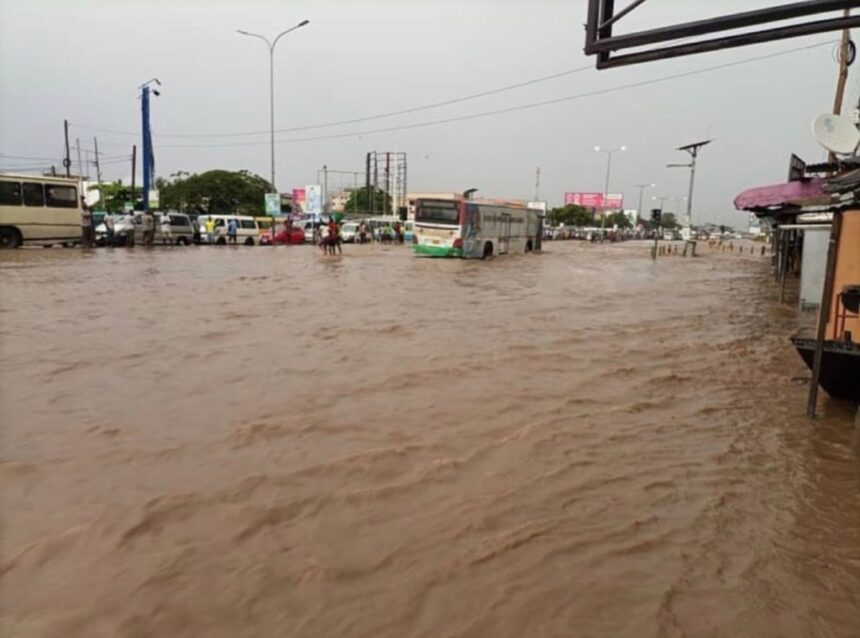Accra, Ghana’s vibrant capital, has long grappled with a persistent and devastating problem: preventable flooding. Far from being solely a consequence of heavy rainfall, the recurrent inundations that cripple the city, claim lives, and destroy property are largely a man-made crisis, deeply rooted in historical urban development patterns and systemic failures.
A History of Submersion:
Accra’s Flood Chronicle
Accra’s vulnerability to flooding is not a recent phenomenon. Records indicate significant flood disasters dating back to the early 1930s, with a disturbing regularity of major events in subsequent decades. Notable floods occurred in 1955, 1960, 1963, 1973, 1986, 1991, 1995, 1999, 2001, 2002, 2010, 2011, 2015, 2018, and 2020.
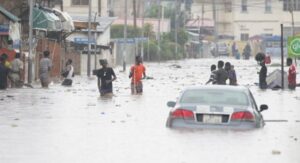
The June 3, 2015, flood stands out as one of the most tragic episodes in Accra’s history, where heavy rainfall combined with a petrol station explosion, leading to over 200 fatalities. This event served as a stark, albeit temporary, wake-up call to the dire consequences of the city’s inadequate flood preparedness.
Historically, colonial land use practices began altering Accra’s natural drainage patterns. However, it was the rapid and largely unplanned urbanization post-independence that significantly exacerbated the problem. As the city expanded, informal settlements mushroomed in low-lying, flood-prone areas, often encroaching on natural waterways and wetlands, setting the stage for the perennial disasters witnessed today.
The Preventable Causes: A Web of Human Factors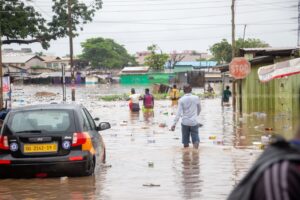
While Accra’s low-lying coastal topography and intense seasonal rainfall contribute to its flood risk, the primary drivers of preventable flooding are overwhelmingly human-induced:
- Inadequate and Choked Drainage Systems: A fundamental flaw lies in Accra’s drainage infrastructure. Many storm drains are either non-existent, too small for the growing population and increased runoff, or, most commonly, severely clogged. Indiscriminate dumping of solid waste, particularly plastics, chokes gutters and prevents the free flow of rainwater, turning streets into rivers during even moderate rainfall.
- Uncontrolled Urbanization and Building on Waterways: Rapid urban expansion has often occurred without adherence to comprehensive planning or zoning regulations. This has led to the construction of unauthorized structures, including homes and businesses, directly on natural waterways, wetlands, and floodplains (such as areas along the Odaw River basin). These structures obstruct water flow, reduce the land’s natural absorption capacity, and worsen inundation.
- Poor Waste Management Practices: The pervasive issue of improper waste disposal is a major contributor. Refuse, when not properly collected or managed, finds its way into drains and rivers, acting as a dam and causing water to overflow. This problem is compounded by rapid population growth and insufficient waste collection services, especially in densely populated informal settlements.

- Weak Urban Planning and Enforcement: Decades of weak enforcement of land use regulations, coupled with cumbersome and expensive development permit processes, have encouraged illegal construction. Regulatory institutions have often been ineffective, leading to chaotic development with little regard for ecological infrastructure or natural water flow paths.
- Lack of Green Infrastructure: The continuous paving over of natural green spaces and the absence of permeable surfaces in urban development reduce the ground’s ability to absorb excess rainwater, increasing surface runoff directly into overwhelmed drainage systems.
- Attitudinal and Behavioral Issues: Beyond systemic failures, a significant “crisis of attitude” exists. The widespread practice of indiscriminate dumping, building on waterways, and a general disregard for environmental rules among some residents and developers directly contributes to the problem.
Comprehensive Solutions:
A Multi-faceted Approach
Addressing Accra’s perennial flooding requires a paradigm shift from reactive, short-term measures to a comprehensive, integrated, and sustained strategy.
- Robust Drainage Infrastructure Modernization:
o Comprehensive Hydrological Study: Conduct a detailed study to map Accra’s topography, existing drainage networks, and water bodies to inform a city-wide drainage masterplan. This plan must account for slope, convergence volume, and future urban growth.
o Expand and Reconstruct Drains: Rebuild and expand existing drainage systems, especially in low-lying areas, using flood-resilient designs. Implement a triple-channel system to separate stormwater from greywater and overflow.
o Green Infrastructure: Integrate nature-based solutions such as permeable pavements, rain gardens, vegetative swales, urban retention ponds, and green roofs to enhance natural water absorption and reduce runoff.
o Road Drainage: Mandate that all new and existing roads incorporate adequate and properly engineered drainage paths, including larger culverts and sub-surface tunnels for utilities.
- Strict Urban Planning and Enforcement:
o Enforce Building Regulations: Immediately map all illegal structures on waterways using geospatial tools and satellite imagery. Enforce demolition with proper legal and humanitarian protocols, prioritizing critical flood-prone zones.
o Strengthen Institutions: Empower and resource the Town and Country Planning Department, Lands Commission, and Municipal/District Assemblies (MMDAs) to strictly enforce zoning laws and building codes. Digitize land records for transparency.
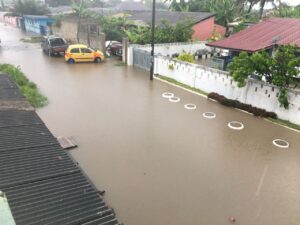
o Mandatory EIAs: Make Environmental Impact Assessments (EIAs) mandatory and rigorously enforced for all construction projects within flood-prone areas.
o Urban Flood Management Act: Enact and enforce a comprehensive Urban Flood Management Act that enshrines mandatory topographic zoning and strict penalties for violations.
- Integrated Waste Management Reform:
o Improved Collection and Segregation: Implement efficient city-wide waste segregation systems and significantly increase waste collection frequency, particularly in densely populated areas.
o Ban Indiscriminate Dumping: Strictly enforce bans on dumping waste into drains, supported by community policing and fines.
o Polluter Pays Principle: Introduce and enforce the “polluter pays” principle, making individuals and entities responsible for environmental degradation bear the cost of mitigation.
o Drainage Covers: Install covers or screens on drains to prevent large debris from entering.
- Behavioral Change and Community Engagement:
o Public Education Campaigns: Launch sustained social marketing campaigns to educate citizens on proper waste disposal, the dangers of building on waterways, and their civic responsibilities in flood prevention.
o Community Mobilization: Engage local chiefs, opinion leaders, and civil society organizations to mobilize communities for regular clean-up exercises, drain desilting, and reporting illegal activities.
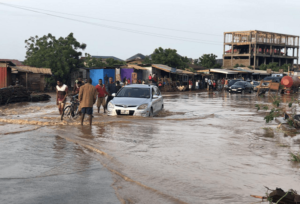
o Incentives and Penalties: Implement a system of incentives for good environmental practices and rigorous, consistent penalties for violations.
o Resettlement Support: Provide safe and humane resettlement options for households displaced by necessary demolitions.
- Institutional Coordination and Funding:
o Inter-Agency Collaboration: Foster seamless coordination among all relevant agencies—AMA, Ghana Meteorological Agency, NADMO, Hydrological Authority, Lands Commission, etc.—to ensure a unified approach to flood management, early warning systems, and rapid response.
o Dedicated Funding: Allocate sufficient and consistent funding for flood prevention infrastructure, maintenance, and enforcement. Exploring mechanisms like an “Accra Resilience Levy” could provide a sustainable funding source.
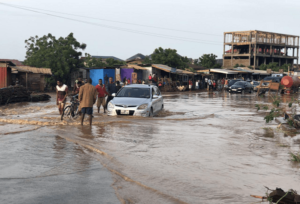
Accra’s flood problem is a complex challenge, but it is not insurmountable. By addressing the historical legacy of unplanned development, tackling the root causes of poor infrastructure and human behavior, and implementing a truly comprehensive, multi-faceted, and sustained strategy, Accra can move towards a future where its residents no longer dread the rainy season.
By Raymond Ablorh, Policy, Strategy & Communication


